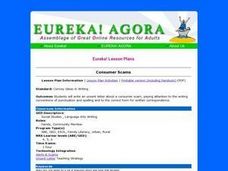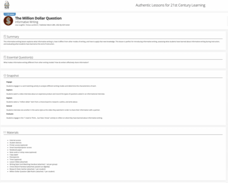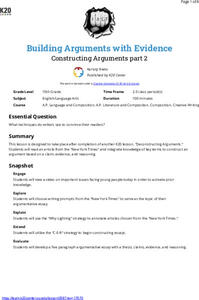Curated OER
Persuasive/Argumentative Essay vs. Opinion writing
Reinforce persuasive and argumentative writing skills with this instructional activity, which utilizes SchoolNet News Network's website/SNN Monthly magazine. Young writers review journalism writing styles that help them explain that...
Prestwick House
Writing Arguments in Response to Nonfiction
Emotional appeal or argument? That is the question. An informative activity helps your class recognize the difference between a logical argument and an emotional appeal and learn how to craft an argumentative response. Writers develop a...
Maryland Department of Education
The Concept of Identity Lesson 7: Logical Fallacies
What are the effects of competition in an academic environment? The competition between the main characters in A Separate Peace motivates a series of activities that asks readers to take a stance on competition, and then to develop a...
Curated OER
Convey Ideas in Writing
Use the platforms of the 2004 presidential candidates to bring persuasive writing to your class. Young voters identify the three issues most important to them in the election and research the issues and candidates' positions. They write...
The New York Times
I Don’t Think So: Writing Effective Counterarguments
When it comes to writing effective arguments, writers must do more than simply make a claim, counterarguments must be considered. Aspiring writers analyze counterarguments in editorials, and then learn how to write counterarguments in...
Curated OER
Toulmin Argument Essay
After viewing a Prezi presentation on Toulmin’s argument, (claim, reason, warrant, backing, grounds, qualifiers, rebuttals), groups re-examine the format, and then individuals craft an argument essay in response to Lord Chesterfields...
Anti-Defamation League
Should Washington's NFL Team Change Their Name?
"What's in a name?" Is it irrelevant, as Juliet suggests in Shakespeare's play, or is nomenclature deeply significant? Young scholars weigh in on the debate by examining the controversy over the NFL's Washington, D.C. Redskins. Groups...
K20 LEARN
Introduction to Arguing Effectively: Argument Writing
Which is better—Chick-fil-A or MacDonalds? High schoolers learn how to craft an argument essay by beginning an opinion statement. They state a claim, back up their claim with evidence, and consider counter calms. Scholars then create a...
EngageNY
Grade 9 ELA Module 4, Unit 1, Lesson 29
Writers review the provided essay rubric, edit and rewrite if necessary, polish their work, and then submit their argument essay.
Newseum
Slanted Facts and Slippery Numbers
The Internet is known as the information superhighway, but sometimes it's hard to know when to hit the brakes on unreliable sources. Using a well-rounded lesson plan, pupils read and summarize articles about the gender pay gap and...
Cornell University
Fibers, Dyes, and the Environment
Nanofibers can be made through electrospinning or force spinning in order to reduce the negative impact on the environment. Pupils study the role of fibers and dye on the environment through a series of five hands-on activities. Then,...
K20 LEARN
Writing An Argumentative Paragraph: Argumentative Writing
Learning how to craft a cogent argument based on a solid claim, supported with evidence and solid reasoning, is an important life skill. Teach middle schoolers about argumentative writing with a lesson plan asking them to analyze the...
K20 LEARN
The Million Dollar Question: Informative Writing
Introduce high school freshmen to the characteristics of informative writing with a 5-day lesson that distinguishes informative writing from other modes. Scholars learn how to search for and cite reliable resources, then research and...
K20 Learn
Building Arguments With Evidence Part 2: Constructing Arguments
New ReviewWhat is the biggest issue facing young people today? Class members consider the question—along with other provocative pieces from the New York Times—and then try to write their own arguments and back them up with evidence. Once complete,...
Literacy Design Collaborative
The Scarlet Letter and Hester Prynne
Is Hester Prynne a virtuous woman? To conclude a unit study of Nathaniel Hawthorne's The Scarlet Letter class members craft an argument essay in which they use the standards listed in Proverbs 31 from the Bible to judge Hester's virtues.
K20 LEARN
Let Us Start The Lettuce Club (Or Not): Writing A Thesis Statement
Let us be frank! Writers learn that crafting a thesis statement is not that difficult if one peals back the layers. After watching several videos about the elements of a thesis, class members read the article "Lettuce Club helps students...
EngageNY
Grade 9 ELA Module 4, Unit 1, Lesson 24
Who bears the most responsibility for ensuring that goods are ethically produced? Using evidence drawn from Sugar Changed the World: A Story of Magic, Spice, Slavery, Freedom, and Science, the unit's central text, and from the...
EngageNY
Grade 10 ELA Module 3: Unit 3, Lesson 10
Can budding writers accept constructive criticism? Learners work with their peers to gain feedback about their argumentative essay drafts. Peers give one another constructive criticism to revise their work better. Using a Peer Review...
Alabama Learning Exchange
The Big Bang Theory: An Evidence-Based Argument
What evidence supports the big bang theory? Individuals analyze scholarly resources about the the theory and develop arguments backed by evidence. They brainstorm, share ideas, watch a video, and read articles to complete a graphic...
Curated OER
Examining Secondary Sources: The American Revolution
Learners who have a grasp on the events of the Revolutionary war view clips from five different films as secondary sources. They take notes on each clip thinking about historic inaccuracies. They then view parts of the film The Patriot...
Curated OER
Argumentation and Logic
Students recognize inductive and deductive reasoning and analyze common fallacies in critical thinking. In this argumentation and logic instructional activity, students use role playing activities and specific instances of inductive and...
K20 LEARN
Building Arguments With Evidence: Constructing Arguments Part 2
The second session in the two-part "Building Arguments with Evidence" lesson asks scholars to craft an argument essay on a topic of interest to them. Writers establish a claim, locate evidence, and justify their stance.
Anti-Defamation League
What Is the Dream Act and Who Are the Dreamers?
The DREAM Act (Development, Relief, and Education for Alien Minors Act) is the focus of a lesson plan that asks high schoolers to investigate the act's provisions and read statements by individuals who support and oppose the act. They...
EngageNY
Grade 9 ELA Module 4, Unit 1, Lesson 23
In "How We Researched and Wrote this Book," the final essay in Sugar Changed the World: A Story of Magic, Spice, Slavery, Freedom, and Science, authors Aronson and Budhos discuss their research methods and purpose in writing the text....

























